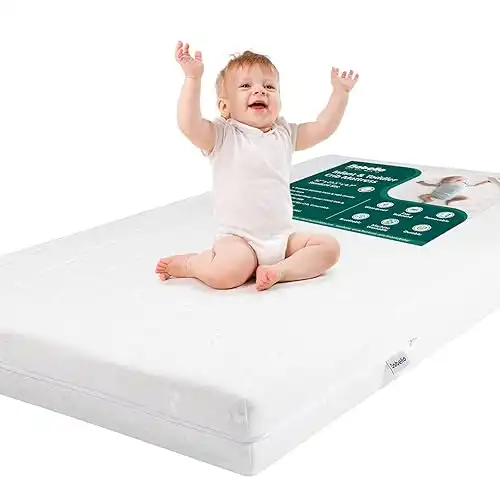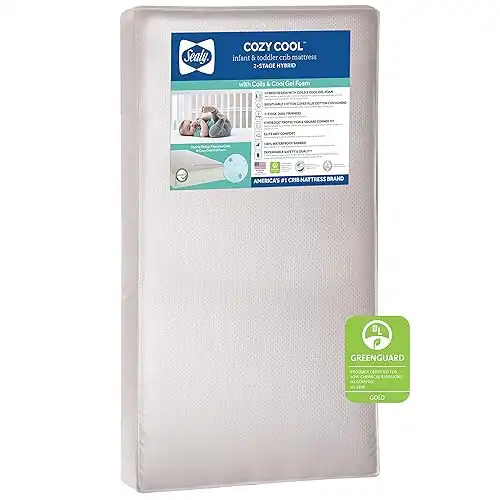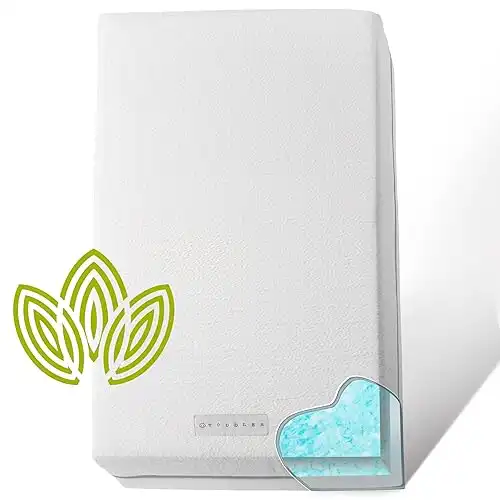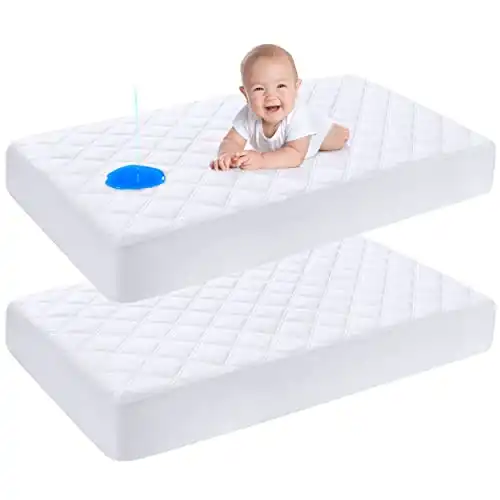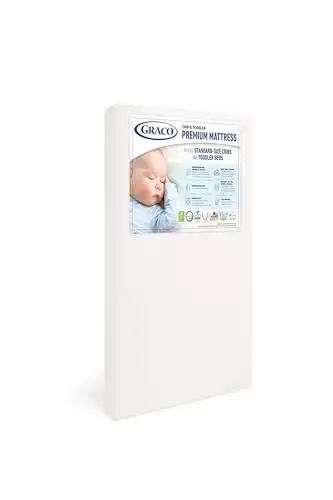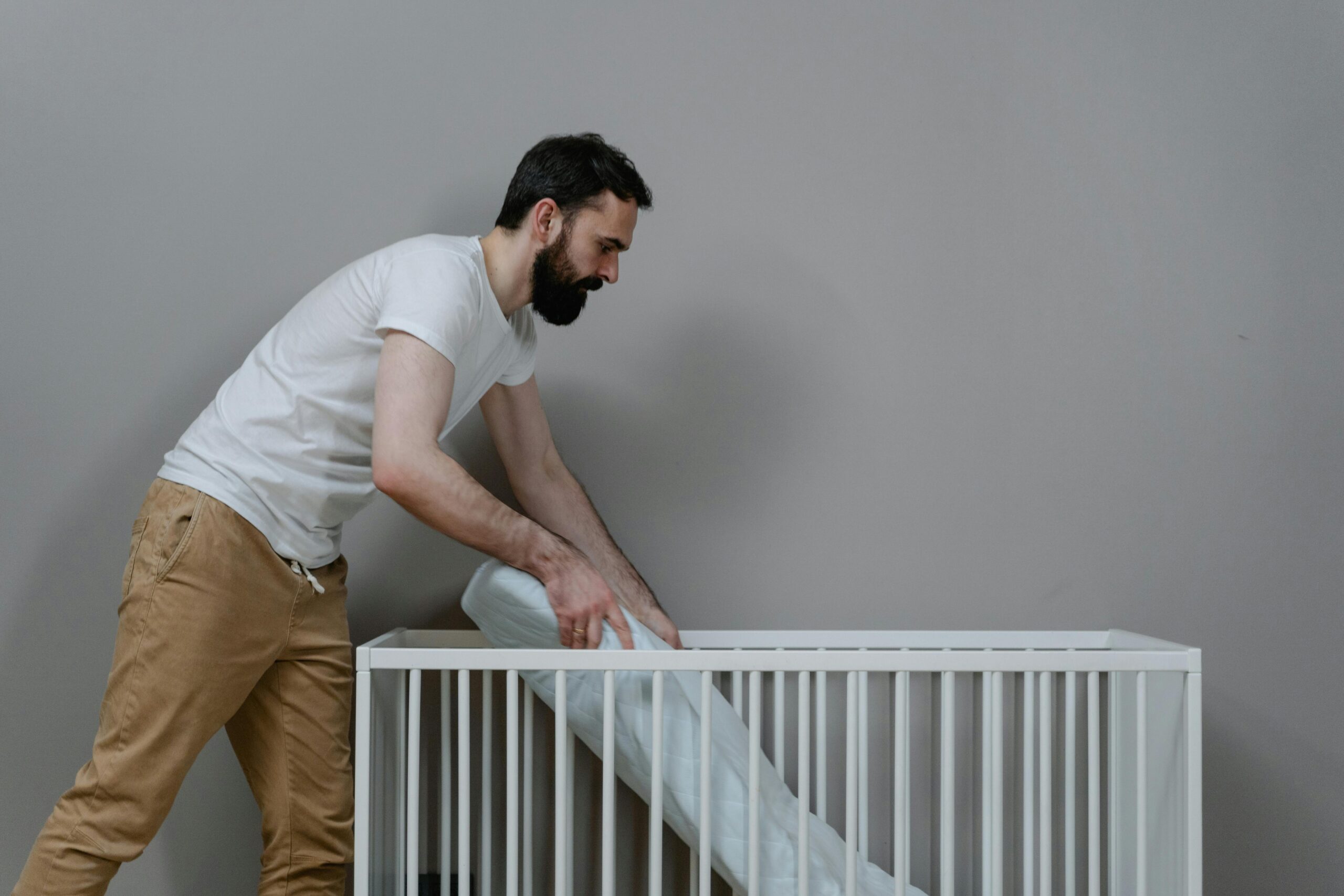
Selecting the ideal crib mattress is essential for your baby’s safety and comfort, but many parents might not be aware that crib mattresses have an expiration date. Wear and tear can impact the quality and safety of a crib mattress over time, raising crucial questions such as: Do crib mattresses expire? How can you tell if it’s time for a replacement? This article will explore everything you need about crib mattress expiration, maintenance, and safety.
Disclaimer: This post contains affiliate links. If you use these links to buy something, I may earn a commission at no extra cost to you. I only recommend products that I personally believe bring value to my readers. Thank you for supporting my work!
How Long Do Crib Mattresses Typically Last?
Crib mattresses typically last between 3 and 5 years, depending on several factors, such as material quality, maintenance, and frequency of use. Your choice of crib mattress type might greatly impact how long it lasts. For instance:
- Foam crib mattresses tend to be lighter and less durable than innerspring mattresses. While cost-effective, they may show signs of wear more quickly, especially if not properly maintained. Top Rated 4.6/5 ⭐⭐⭐⭐⭐BABELIO Foam Breathable Crib Mattress$144.99Buy Now
The BABELIO Breathable Crib Mattress offers dual-sided comfort for your growing child. One side f...
12/26/2024 02:53 am GMT - Innerspring crib mattresses: These mattresses are typically more durable and last longer due to the metal coils that provide support. They tend to resist sagging and maintain their shape for longer periods. Top Rated 4.7/5 ⭐⭐⭐⭐⭐Sealy Baby Cozy Cool 2-Stage Dual Firmness$123.99Buy Now
The Sealy Baby Cozy Cool 2-Stage Crib Mattress offers firm innerspring support for infants and a ...
04/02/2025 08:58 am GMT - Organic crib mattresses: Made from natural latex, wool, or organic cotton, these mattresses often last longer due to the high-quality materials used. They also offer the added benefit of being hypoallergenic. Top Rated 4.7/5⭐⭐⭐⭐⭐Organic Cotton Dual-Sided Crib Mattress$138.50Buy Now
The Organic Cotton Dual-Sided Crib Mattress provides firm support for infants and a cooling gel l...
04/02/2025 08:58 am GMT
Other factors also affect the lifespan of a crib mattress. Using a mattress protector, for example, can stop moisture from penetrating the mattress and growing bacteria or mold. Regular cleaning and rotating the mattress can prevent sagging and ensure even wear. Finally, how often the mattress is used affects its longevity. A mattress that is used daily will likely wear out faster than one used occasionally.
The Yoofoss Waterproof Crib Mattress Protector 2 Pack keeps your baby's crib dry and cozy. With a...
It’s important to note that a mattress used for multiple children may degrade faster. While it may be tempting to reuse a crib mattress for a second or third child, it’s essential to thoroughly inspect the mattress for signs of wear and tear before doing so.
Key Takeaway: Crib mattresses typically last 3 to 5 years, depending on the material, maintenance, and usage. Regular care can help extend the lifespan, but parents should always prioritize their baby’s safety by replacing a mattress when signs of wear appear.
Signs Your Crib Mattress Needs to Be Replaced
Crib mattresses undergo wear and tear over time, and recognizing when to replace one is critical for your baby’s safety. Here are some key signs to look for:
- Sagging or uneven surface: A mattress that no longer holds its shape or has dips can create an unsafe sleeping environment, as it doesn’t provide proper support.
- Visible stains or odors: Stains and lingering smells may be signs of mold, germs, or allergens that could harm your baby’s health.
- Rips or tears: A torn cover can expose the mattress’s inner materials, making it more prone to harboring dust mites and allergens and compromising its structural integrity.
- Loss of firmness: A mattress can lose its firmness over time. A mattress that seems overly soft or uneven is no longer safe for babies; instead, they require a firm, flat surface to lower their risk of SIDS.
These signs indicate that the mattress may no longer provide your child with a safe, supportive, or hygienic sleep environment.
Key Takeaway: If you notice sagging, stains, tears, or a loss of firmness in your crib mattress, it’s time to replace it to maintain your baby’s safety and comfort.
Health and Safety Concerns with Old Crib Mattresses
Parents should be aware of the health and safety dangers of using an outdated crib mattress. Over time, crib mattresses can deteriorate in ways that are not immediately visible, leading to potential hazards for your baby.
- Increased Risk of SIDS: One of the most significant concerns with old crib mattresses is the potential for increased risk of Sudden Infant Death Syndrome (SIDS). A mattress that has become too soft, uneven, or sagging can create an unsafe infant sleeping environment. If a baby rolls onto their stomach, it requires a hard, flat surface to lessen the chance of asphyxia or carbon dioxide rebreathing.
- Accumulation of Allergens and Bacteria: As crib mattresses age, they may accumulate dust mites, mold, and bacteria, especially if the mattress has not been properly cleaned or maintained. Due to this, your baby may experience skin irritations, allergic reactions, and respiratory problems.
Moisture from spills, leaks, or diaper accidents can seep into the mattress, creating an environment where bacteria and mold thrive.
- Exposure to Harmful Chemicals: Some older crib mattresses, especially those made with synthetic materials or chemical treatments, may release harmful chemicals over time. Foam mattresses, in particular, can off-gas volatile organic compounds (VOCs) as they degrade. These chemicals can potentially affect your baby’s air quality and long-term health.
- Structural Weakness: Over time, the structural integrity of a crib mattress may weaken, especially with frequent use or improper storage. Sagging, broken springs in innerspring mattresses, or compressed foam can all create a sleeping surface that’s no longer supportive. As the baby gets older, this loss of support may cause discomfort and developmental problems.
- Poor Hygiene: A mattress used for multiple children or bought second-hand may harbor stains, smells, and bacteria from previous use. Even if the exterior appears clean, the interior materials may still contain pathogens that are difficult to remove and pose a hygiene concern.
Key Takeaway: Old crib mattresses can harbor allergens, bacteria, and mold and, if they lose firmness, may increase the risk of SIDS. Prioritize your baby’s safety by replacing mattresses that show signs of deterioration or have been used for extended periods.
How to Properly Maintain a Crib Mattress for Longevity
A crib mattress must be maintained to last longer and continue to provide your child with a safe and pleasant surface. Following simple maintenance practices, parents can keep the crib mattress in good condition and avoid early replacement. Here are some practical tips to help extend the life of your crib mattress:
- Use a Waterproof Mattress Protector: One of the best purchases you can make to keep your mattress clean and protected is a waterproof mattress protector. These protectors act as a barrier, preventing moisture from reaching the mattress, which can lead to mold, mildew, and bacteria growth. They also help shield the mattress from spills, diaper leaks, and sweat, which can cause staining and odors.
- Clean the Mattress Regularly: Regular cleaning is essential to maintaining the hygiene of the crib mattress. Start by vacuuming the mattress surface to remove dust, dirt, and crumbs that may accumulate over time. Use a mild soap and water solution to spot-clean any stains for deeper cleaning, but avoid soaking the mattress. Before placing on sheets, always let it dry completely to avoid moisture buildup, which can result in the growth of mold and mildew.
- Rotate the Mattress Periodically: Rotating the mattress every few months helps distribute wear evenly across the surface. Crib mattresses are often subjected to pressure in the same areas, especially as your baby grows and moves around during sleep. By rotating the mattress head-to-foot, you can prevent uneven wear and sagging, which will help maintain its firmness and support for a longer period.
- Ensure Proper Ventilation: Proper ventilation is crucial for crib mattresses, especially foam ones. Keep the mattress in a dry, well-ventilated place when not in use. Avoid placing the crib mattress directly on the floor or in damp environments, as this can lead to moisture accumulation and mold growth. Periodically airing out the mattress can also prevent musty odors from developing.
- Avoid Jumping or Rough Use: Crib mattresses are designed for infants and young children and may not withstand rough use, such as jumping or excessive weight. Encourage kids not to use the mattress as a play area, which might shorten its lifespan and harm its interior structure. This is especially important for innerspring mattresses, where the coils could become damaged from excessive force.
- Store the Mattress Correctly: If you plan to store the crib mattress between uses, make sure it’s stored in a clean, dry place where it’s protected from moisture, dust, and pests. Use a mattress storage bag or cover to keep the mattress clean while in storage. Stressing the mattress flat is best to prevent any warping or bending that can affect its structure.
- Use the Mattress as Intended: Some crib mattresses have two sides: one for toddlers and one for babies. If your mattress has this feature, ensure you use the correct side for your child’s age and weight. The infant side is typically firmer and necessary for safe sleep, while the toddler side offers more comfort.
Key Takeaway: Proper crib mattress maintenance, including using a waterproof protector, regular cleaning, and rotating the mattress, can extend its lifespan and keep it safe for your baby. Regular care helps ensure the mattress remains firm, hygienic, and comfortable.
The Yoofoss Waterproof Crib Mattress Protector 2 Pack keeps your baby's crib dry and cozy. With a...
When Should You Buy a New Crib Mattress?
Knowing when to buy a new crib mattress is crucial for your baby’s safety, comfort, and overall well-being. While a crib mattress has no official expiration date, several signs and situations indicate it’s time for a replacement. Below are key factors to help parents determine when a new crib mattress is necessary:
- Visible Symptoms of Wear and Tear: The clearest indicator that it’s time for a new crib mattress is seeing visible symptoms of wear and tear. Over time, a mattress can develop:
- Sagging or indentations: A crib mattress must maintain its firmness to provide adequate support for a baby. If it begins to sag or has noticeable indentations, it can create an uneven sleep surface, hence raising the possibility of SIDS (Sudden Infant Death Syndrome).
- Rips or tears in the cover: A torn mattress cover can expose the interior materials to moisture and dirt, leading to bacteria and mold growth. It also reduces the mattress’s ability to provide a clean, supportive sleep environment.
- Stains or discoloration: Stains may not only be unsightly but can also indicate that moisture has seeped into the mattress, potentially leading to mold, mildew, or bacterial contamination.
- Loss of Firmness: A firm sleep surface is crucial for infants to reduce the risk of suffocation and SIDS. Over time, crib mattresses can lose their firmness, especially after prolonged use or if used by multiple children. If you notice that the mattress feels too soft, uneven, or less supportive than it once was, it’s a sign that it no longer meets safety standards, and replacing it is essential.
- Second-Hand or Hand-Me-Down Mattresses: While it may be tempting to reuse a crib mattress from an older child or accept a second-hand mattress from family or friends, it’s important to consider the potential risks. Second-hand mattresses may have unseen damage, including internal wear, hidden mold, or loss of firmness, even if they appear in good condition outside. Studies have also suggested that using second-hand mattresses may increase the risk of SIDS.
If you must use a second-hand mattress, thoroughly inspect it for signs of wear, sagging, or contamination. However, buying a new crib mattress is often the safer option.
- After Several Years of Use: Even with good care, crib mattresses naturally degrade. Most are designed to last 3 to 5 years. If the mattress has been used for several years, especially for multiple children, it may no longer provide the same level of support or safety. Even if there are no visible signs of damage, it’s worth considering replacement after several years of heavy use to ensure your baby has the safest possible sleep environment.
- Transition to a New Crib or Nursery: When transitioning your baby to a new crib, whether due to a nursery update or moving to a larger space, it’s a good time to evaluate whether a new mattress is needed. A new crib often means new bedding, and starting fresh with a new, high-quality crib mattress can provide peace of mind that the surface your infant is sleeping on is secure and comforting.
- Unpleasant Odors: Even if properly cleaned, crib mattresses can absorb odors from sweat, spills, and diaper leaks over time. Suppose you notice any lingering or unpleasant smells. In that case, this may indicate the presence of mold or bacteria within the mattress, and it’s best to replace it to maintain a healthy sleep environment.
Key Takeaway: Parents should replace a crib mattress when there are visible signs of wear, loss of firmness, unpleasant odors, or after several years of use. It’s also wise to buy a new mattress when transitioning to a new crib or avoiding potential risks with second-hand mattresses. Prioritizing safety and comfort ensures your baby gets the restful, secure sleep they need.
|
4.6
|
4.7
|
4.8
|
4.7
|
|
$144.99
|
$123.99
|
$89.99
|
$138.50
|
Conclusion
Crib mattresses don’t have an official expiration date, but they wear out over time. As a parent, it’s important to recognize the signs of a worn-out mattress and understand the potential health risks of using an old one. Maintaining your crib mattress and knowing when to replace it can ensure your baby sleeps safely and comfortably.
FAQs
Can I use a second-hand crib mattress?
It’s generally recommended to avoid using second-hand crib mattresses unless you are sure of their condition. Always check for wear, mold, and firmness.
How often should I clean a crib mattress?
Clean the crib mattress at least once every few months and immediately after spills to maintain hygiene.
Are crib mattresses one-size-fits-all?
No, crib mattresses come in different sizes. Ensure the mattress fits snugly in your crib with no gaps.
Can a crib mattress be flipped?
Some crib mattresses are dual-sided and designed for both infants and toddlers. Check the manufacturer’s instructions to see if flipping is recommended.
What is the best material for a crib mattress?
Organic materials such as cotton and latex are hypoallergenic and breathable, but memory foam and innerspring mattresses are also popular for their support.
Additional Resources
- Safe Sleep for Babies: Crib Mattress Guidelines (Safe Kids Worldwide)
- Crib Mattress Safety Tips (American Academy of Pediatrics)
- How to Choose a Crib Mattress (Consumer Reports)

